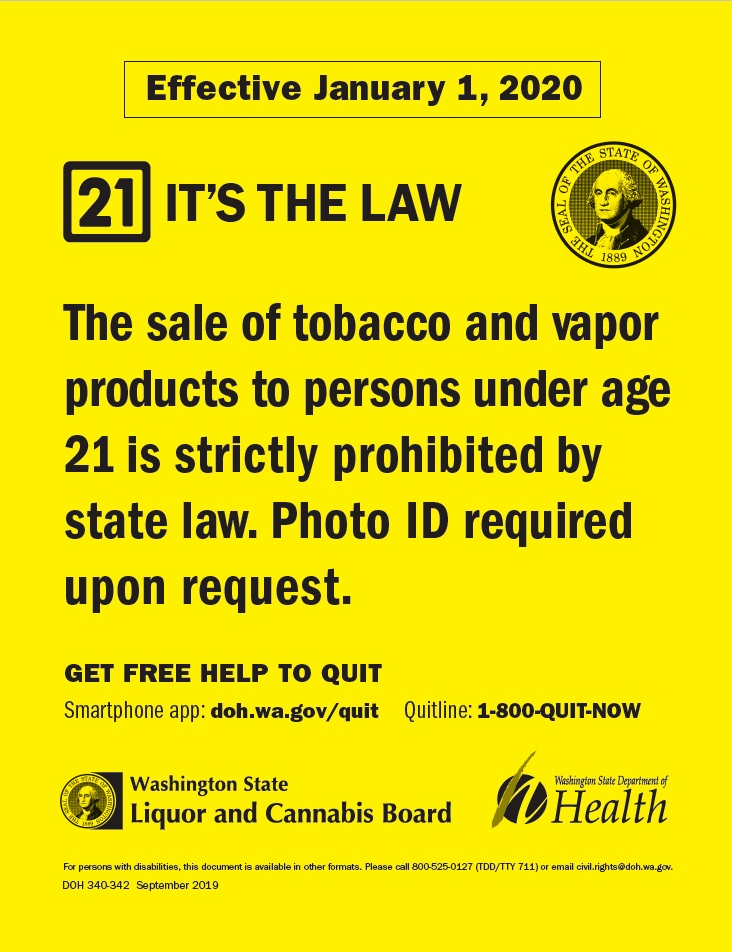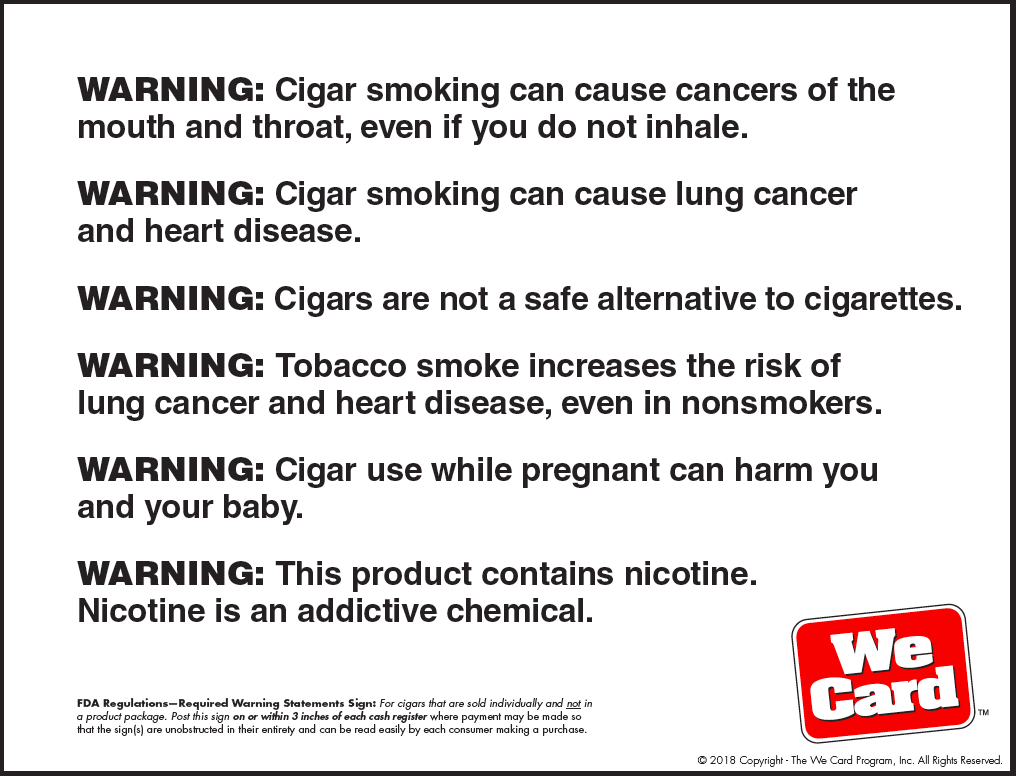State Summary
State
Customers must be 21 years or older to purchase tobacco products (cigarettes, cigars, tobacco in any form), e-cigarettes, vapor products, cigarette paper or wrapper (See Restricted Products section). It is illegal to sell, give or furnish or permit to be sold or given restricted products to anyone under 21 years of age.
Federal
Deny sales to anyone under 21 years old for FDA regulated products (SEE Restricted Products section).
Note: The new federal 21 year minimum-age for FDA regulated products of all tobacco and vaping products (SEE Restricted Products section) was declared immediately effective on December 20, 2019. This law allows for no exceptions.
You must Check photo ID of everyone under age 30 who attempts to purchase FDA regulated products and verify the customer is of legal age to purchase. This is an each-and-every time requirement (even if you know the person to be of legal are.) If you "carded" them yesterday, you must "card" them again today!
Decline a sale when the customer is underage, has no photo ID, the photo ID contains no date-of-birth or the photo ID has expired.
State
Cigarettes, cigars, vapor products (e-cigarettes, e-cigars, vapor cartridges or other similar devices) cheroots, stogies, periques, granulated, plug cut, crimp cut, ready rubbed, and other smoking tobacco, snuff, snuff flour, cavendish, plug and twist tobacco, fine- cut and other chewing tobaccos, shorts, refuse scraps, clippings, cuttings and sweepings of tobacco, and other kinds and forms of tobacco, prepared in such manner as to be suitable for chewing or smoking in a pipe. Restricted products include cigarette paper or wrapper.
Federal
FDA regulations apply to these tobacco products defined under the Tobacco Control Act as any product made or derived from tobacco or containing nicotine from any source (e.g., synthetic nicotine) that is intended for human consumption.
- Cigarettes, cigarette tobacco, and roll-your-own tobacco
- Do NOT break open cigarette packages to sell products in smaller amounts.
- Do NOT sell single cigarettes, also called "loosies."
- Do NOT sell cigarette packages containing fewer than 20 cigarettes.
- Do NOT sell flavored cigarettes, cigarette tobacco or roll-your-own tobacco (other than menthol or tobacco.)
- Only sell in a direct face-to-face exchange*.
- Smokeless tobacco
- Do NOT break open packages to sell products in smaller amounts.
- Only sell in a direct face-to-face exchange*.
- Do NOT sell without a health warning label.
- Cigars
- Hookah & Pipe tobacco
- Dissolvable tobacco products
- Nicotine gels
- Electronic Nicotine Delivery System (ENDS), which are products such as:
- e-cigarettes
- e-hookah
- ecigars
- vape pens
- advanced refillable personal vaporizers
- electronic pipes
- Components and Parts, such as:
- e-liquids**
- atomizers
- batteries (with or without variable voltage)
- cartomizers (atomizer plus replaceable fluid-filled cartridge)
- digital display/lights to adjust settings
- clearomisers
- tank systems
- flavors
- vials that contain e-liquids
- programmable software
- Do NOT give away free samples of any of these FDA regulated products or components and parts. EXCEPTION: Free samples of smokeless tobacco are only allowed in a "qualified adult-only facility" -- where no person younger than 21 is permitted to enter or be present (or a higher minimum-age if your state or locality has a higher age limit.)
- Do NOT sell in vending machines UNLESS you operate a "qualified adult-only facility" -- where no person younger than 21 is permitted to enter or be present (or a higher minimum-age if your state or locality has a higher age limit.) Some state laws prohibit tobacco product vending machines. Check your state law.
EXCLUDED from FDA regulation are accessories, such as: ashtrays, spittoons, hookah tongs, cigar clips and stands, pipe pouches, humidors.
* The sale of cigarettes, cigarette tobacco and smokeless tobacco through vending machines and self-service displays are allowed ONLY in adult-only facilities where no person younger than 21 is permitted to enter or be present (or a higher minimum-age if your state or locality has a higher age limit.)
** Retail establishments, such as vape shops, that mix and/or prepare e-liquids or assemble vaporizers are considered "tobacco product manufacturers." Many separate regulations will apply. See FDA regulations for tobacco product manufacturers at www.fda.gov.
State
Identification must be valid (not expired) and show: the bearer's date of birth, the bearer's signature (except US Military ID), a photograph of bearer. Acceptable IDs include:
Driver's License, Instruction Permit, or I.D. Card issued by any U.S. State, U.S. Territory and District of Columbia; Driver's License, Instruction Permit, or I.D. Card issued by any Canadian Province; Valid Washington State Temporary Drivers' License; U.S. Armed Forces I.D. Card (Encrypted signature acceptable); Merchant Marine I.D. Card issued by the U.S. Coast Card; Official Passport, Passport CArd, NEXUS Card.
Washington State Tribal Enrollment Card (No expiration date required) for the following:
Cowlitz Indian Tribe, Upper Skagit Indian Tribe, Swinomish Indian Tribe Community, Nez Perce Tribe, Lummi Nation, Spokane Tribe, Skokomish Tribe, Stillaguamish Tribe, Kalispel Tribe, Suquamish Tribe, Nisqually Indian Tribe, Puyallup Tribe of Indians, Snoqualmie Tribe, Nooksack Indian Tribe, Confederated Tribes of the Chehalis Reservation, Muckleshoot Indian Tribe, The Tulalip Tribes.
Federal
Unless otherwise required by state or local law, FDA recommends that retailers accept only government-issued photographic identification with the bearer’s date of birth. (e.g., State-issued driver’s license or identification card, military identification card, passport or immigration card) for establishing a legal age to purchase FDA regulated products. The Photo ID is not acceptable if it has expired.
State
Violations are gross misdemeanors. Licensed retailers who violate the law are subject to having their license suspended or revoked, or a fine of up to $200 for the first offense. Additional offenses within any three-year period may subject the retailer to up to a $600 penalty for the second offense; up to $2,000 and license suspension for 6 months for the third offense; up to $3,000 and license suspension for 12 months for the fourth offense; and revocation of license with no possibility of reinstatement for 5 years for the fifth offense.
Employees who violate the law are subject to a penalty of $50 for the first offense and $100 for subsequent offenses. The state may develop and offer a class for retail clerks found guilty of a first violation, in lieu of the fine. The board may exceed the penalties set forth, based on aggravating circumstances.
Federal
FDA has a variety of enforcement tools to address retailers who violate Federal statutes or regulations, including civil money penalties, warning letters, seizures, injunctions, no-sale orders and/or criminal prosecution. Retailers who violate the regulations may also be in violation of state law and subject to state penalties or other related orders.
State
It is a defense that a seller reasonably relied on proof of age. Suspension or revocation may be waived if the retailer demonstrates that he acted in good faith to prevent violations.
Federal
Federal law provides that the FDA shall adopt regulations that may provide any retailer that implements the “approved training program,” a reduced civil money penalty if that retailer is found in violation. The FDA does not require training, but it recommends retailers train and educate their employees.
Until the FDA issues guidance or regulations on what constitutes an FDA “approved training program,” the FDA indicates “the agency intends to use a lower maximum civil money penalties schedule for all retailers who violate the regulations restricting the sale and distribution of cigarettes and smokeless tobacco products, whether or not they have implemented a training program. However, FDA may consider further reducing the civil money penalty for retailers who have implemented a training program.”
State
It is illegal for a minor to purchase, possess or obtain, or attempt to purchase, possess or obtain Restricted Products. Violators are subject to a fine of up to $50 and/or up to four hours of community service. The court may also require participation in a smoking cessation program.
Federal
Not applicable under Federal law

State
Retail tobacco and vapor product licensees must post a sign (provided free of charge by the Liquor and Cannabis Board) that is clearly visible to anyone purchasing restricted products that says:
THE SALE OF TOBACCO OR VAPOR PRODUCTS TO PERSONS UNDER AGE 21 IS STRICTLY PROHIBITED BY STATE LAW. PHOTO ID REQUIRED UPON REQUEST.
Failure to post the sign may result in a fine of up to $200 for a first offense. For subsequent offenses within a 3 year period, the penalties are up to $600 for a second offense, up to $2,000 and license suspension for 6 months for a third offense, up to $3,000 and license suspension for 12 months for a fourth offense; and license revocation with no possibility of reinstatement for 5 years for the fifth offense.
Information from the Washington State Liquor and Cannabis Board website indicates that required signs are available at no charge to licensees. To order, call the WSLCB Enforcement Customer Service Line at (360) 664-9878 or email EnfCustomerService@lcb.wa.gov .
Federal
Effective 8/10/18: For retailers who sell cigars individually without packaging, there is an FDA sign requirement. Download We Card's Sign
Alert: A U.S. District court overturned this regulation in February 2020. However, there are expectations this regulation will be revisited and may be reinstated after ongoing adjustments or legal matters before the courts. Therefore, retailers need to be prepared for this requirement IF it is required once the legal matters are resolved by the court.
Cigars Sold Individually without Packaging - Retailers who sell cigars individually, and not in a product package must post a sign at each point-of-sale that displays all six of the required warning statements per 21 CFR § 1143.5(a)(3). Each sign must be at least 8.5x11 inches in size; clear, legible, and conspicuous; printed in black Helvetica bold or Arial bold type or other similar sans serif fonts against a solid white background, in at least 17-point font size with appropriate spacing between the warning statements; posted on or within 3 inches of each cash register where payment may be made; and unobstructed in its entirety and read easily by each consumer making a purchase. The required warning statements on the sign must be: printed in a manner that contrasts, by typography, layout, or color, with all other printed material; and capitalized and punctuated as indicated above.

State
As a condition of receiving federal substance abuse block grant funds, federal law requires the state to conduct random, unannounced inspections of tobacco and vapor product outlets to determine compliance rates. The Washington State Liquor and Cannabis Board coordinates the inspections.
Federal
FDA conducts compliance checks of retail stores to determine whether retailers are complying with the new federal law, using:
- Attempted purchases of tobacco using underage customers.
- Inspections of stores for other compliance requirements.
- Inspections of stores in response to public complaints to the FDA’s request for the general public to report suspected store violations (1-877-CTP-1373 or AskCTP@fda.hhs.gov)
The FDA indicates that it will conduct follow-up compliance checks on stores found in violation.
State
Minor license is vertical. AGE 21 ON 00-00-0000 and/or AGE 18 ON 00-00-0000 is in black next to photo. For drivers under 18, INTERMEDIATE LICENSE is under the state name. For additional information about minor licenses, go here.
Federal
Not applicable under Federal law
State
None
Federal
See additional information and requirements on advertising, labeling and promotion requirements -- available here.




